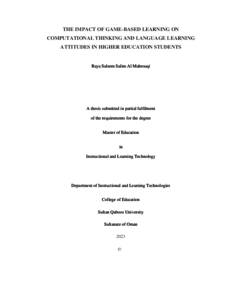Document
The Impact of game-based learning on computational thinking and language learning attitudes in higher education students.
Source
Master's thesis
Other titles
تأثير التعلم القائم على الألعاب على التفكير الحاسوبي والسلوكيات تجاه تعلم اللغة لدى طالب التعليم العالي
Country
Oman
City
Muscat
Publisher
Sultan Qaboos University
Gregorian
2024
Language
English
Thesis Type
Master's thesis
English abstract
Computational thinking (CT) is recognised as a fundamental skill in the 21st century, potentially
improving problem-solving and creative thinking abilities. Given its broad applicability, there is
a growing emphasis on introducing CT in education. Additionally, Oman Vision 2040 underscores
the importance of advancing education and nurturing a highly skilled workforce, emphasising the
need for computational thinking, problem-solving, critical thinking, and algorithmic reasoning
skills. Thus, since previous research has primarily focused on middle and high school students,
and the studies for higher education showed that students lack CT competencies, this study extends
the investigation to higher education students. Moreover, integrating CT into the curriculum calls
for innovative teaching methods, such as game-based learning, which promises to engage students
in complex activities closely aligned with CT principles. This research endeavours to investigate
the impact of game-based learning on the CT skills and attitudes towards language learning of
higher education students with consideration of potential gender-based differences. The problem
statement highlights CT's significance and the pressing need for improved CT competencies
among students. A comprehensive methodology employed a quasi-experimental design,
encompassing pre-and post-tests, interviews, and questionnaires, to gather data from 24 Sultan Qaboos University Foundation students. The findings showed a considerable positive impact on higher education students’ CT skills as well as their language learning attitudes. In light of the research findings, it is recommended that game-based learning be incorporated into higher education curricula to enhance CT skills and engagement.
Arabic abstract
التفكير الحاسوبي هو مهارة أساسية في القرن الحادي والعشرين والتي من شأنها تحسين قدرات حل المشكلات والتفكير الابداعي. ونظ ًرا لتوسع تطبيقها، ثمة تركيز متناٍم على إدراج مهارة التفكير الحاسوبي في نطاق التعليم، إضافة إلى تأكيد رؤية عمان 2040 على أهمية تعزيز التعليم وتأهيل القوى العاملة بمهارات التفكير الحاسوبي وحل المشكلات والتفكير النقدي بالاضافة إلى مهارة الاستدلال بالخوارزميات. بالتالي، نظرا لأن الدراسات السابقة سلطت الضوء غالبا على طلبة مرحلة الدبلوم العام. وأكدت دراسات أخرى افتقار طلبة التعليم العالي لمهارات التفكير الحاسوبي، يهدف هذا البحث إلى توسيع نطاق الدراسة ليشمل طلبة التعليم العالي. ويجدر الاشارة إلى أن دمج التفكير الحاسوبي في المناهج الدراسية يتطلب تفعيل أساليب تعليمية مبتكرة كالتعليم القائم على الالعاب الذي يطمح إلى فتح آفاق جديدة لجذب الطلبة إلى أنشطة دقيقة ومعقدة تواءم مع مهارات التفكير الحاسوبي. ومن هذا المنطلق، يهدف هذا البحث إلى تقصي تأثير التعليم القائم على الالعاب على مهارات التفكير الحاسوبي والسلوك تجاه تعلم اللغة لدى طلبة التعليم العالي مع مراعاة الفروق الجنسية المحتملة وبالتحديد طلبة الدراسات التأسيسية في جامعة السلطان قابوس. ويستخدم هذا البحث التصميم شبه التجريبي حيث تتكون عينة الدراسة من 24 طالًبا تم تقسيم الطلبة إلى مجموعة تجريبية ومجموعة المقارنة . ويستخدم البحث اختبار قبلي وبعدي لقياس التأثير واستبيانات ومقابالت لجمع البيانات من العينة. أظهرت النتائج تأثيرا أيجابيا ملحوظا على مهارات التفكير الحاسوبي لدى طلبة التعليم العالي وكذلك على سلوكهم تجاه تعلم اللغة.وفي ضوء هذه النتائج، يُوصى بإدماج التعليم القائم على الالعاب في مناهج التعليم العالي لتعزيز مهارات التفكير الحاسوبي وزيادة مستوى مشاركة الطلبة وتفاعلهم..
Category
Theses and Dissertations

